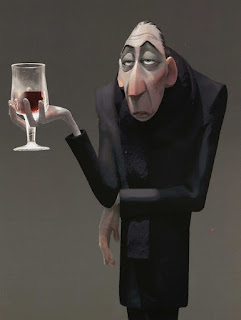Theatre Thoughts: The Role of the Critic
The times, they are a-changing... and the arts, by necessity are changing with them. The way I want to think about here is theatre criticism.
Image Source: llamawaffle.tumblr.com (if anyone can tell me the original owner of the artwork I will gladly credit them!)
In the past the Critic has been a figure of power; feared and despised: Ashwin Sanghi said that "...the relationship between critic and writer is similar to the one between the pigeon and the statue." and Tennyson wrote that a critic is "a louse in the locks of literature." However, Dustin Hoffman is quoted as saying that "a good review from the critics is just another stay of execution." Critics, especially in the age of the printed word, often possessed control over the success, or demise of a production; stories about of shows being cancelled after opening night when the reviews were dire. (Leaving aside the now legendary panning of Les Mis) However, in the digital age, the power has shifted and the role of the critic is one that is now being questioned.
"A good drama critic is one who perceives what is happening in the theatre of his time. A great drama critic also perceives what is not happening."
KENNETH TYNAN
"The critic has to educate the public; the artist has to educate the critic"
OSCAR WILDE
"The public is the only critic whose opinion is worth anything at all."
MARK TWAIN
This quote from Mark Twain is particularly prescient. In an age of instant connection and world wide media, a well phrased tweet can have more power than the most critically insightful review of a production or a piece of art.
Image Source: twitter.com
Nowadays, bloggers are just as likely to be invited to a press night as the traditional medium critics from broadsheets and journals. Indeed, the National Theatre Shed held a specific event for invited bloggers.
The role of the critic has traditionally been to inform and advise: those planning a visit to the theatre may decide for or against a particular production based on a review read in the Sunday papers. Nowadays it is probably more likely that a review will be read online, followed by having a look at several different opinions, and maybe deciding on something completely different.
One of the main problems with any form of criticism is that taste is subjective. I experienced this personally when I attended a production that had received good reviews and lots of positive posts on Twitter, but I found puerile and amateurish. For every bad review blog read there may be another writer who loved it. While this could be an example of an egalitarian model of criticism, it could also be serving to muddy the waters, making it unclear as to what may actually be worth seeing. But then, as previously stated, taste is subjective so what I love, you may hate.
Image Source: gudungisengblog.blogspot.com
I don't know what the end result will be. I think traditional print media is dying anyway, and that in my lifetime we will see the final daily newspaper being pulled from the shelves. In conversation last week I mentioned, to an avid reader of the Observer, that I had read the same article but I had accessed it online after finding it through a keyword search on Google. I think this is the way it is going, and that critics affiliated to recognised institutions such as the Guardian, will still have some sway over theatre makers and practitioners. But, when star reviews from bedroom bloggers and the twittersphere sit happily alongside the Telegraph and Independent on marketing materials, their power is waning and, to paraphrase Mark Twain, the public's opinion matters.
P.S. I realise I sound quite disdainful here (bedroom bloggers) and I realise I am one of those! No need to point out this seeming hypocrisy!






Comments
Post a Comment